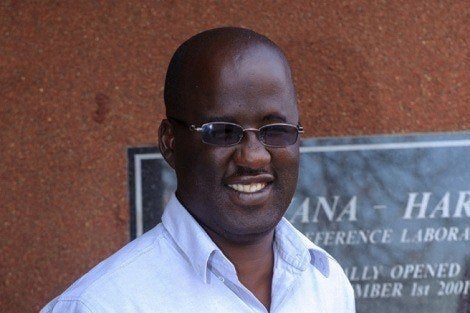When the Botswana–Harvard AIDS Institute Partnership (BHP) was launched in 1996, the official goal was collaborative research and training between the Republic of Botswana and the Harvard School of Public Health AIDS Initiative. But for Dichaba Siane—a 40-year-old hospital worker in the capital, Gaborone, who chairs the local Community Advisory Board (CAB)—the scientific teamwork has transformed not only his community and country, but also himself.
According to Siane, the BHP has dramatically improved health and health care management in Botswana. Clinical trials using antiretrovirals to prevent mother-to-child transmission, for example, have shown that the rate of children born HIV-positive can be cut from 40 percent to less than 1 percent. “The research was done mainly in Gaborone,” he said, “but the benefits have cascaded through the entire country.”
Treatment for tuberculosis—a ubiquitous and deadly opportunistic infection that has shadowed the AIDS epidemic—has also advanced. “The care has improved so much that if you are on treatment, you will complete your treatment and you will be cured,” said Siane.
And randomized trials using antiretrovirals to prevent viral transmission when one person in a couple is infected and the other is not have also altered the social and emotional landscape. “The study proved without any doubt that it is possible to protect oneself and one’s partner,” Siane added.
But the most impressive development may be that thousands of Siane’s countrymen have volunteered for studies. Batswana, as people from Botswana are called, were reluctant to participate in early clinical trials because they feared having blood drawn. “Blood plays a very important role in the culture. It’s sacred. My blood should be with me—it should not be taken and kept somewhere else,” Siane explained. “However, we’re working through that. Now there are quite a number of people who are comfortable with blood draws, because they realize the importance of blood in terms of research and possible help for the future generation.”
For Siane—who as CAB chairperson has informally served as educator, translator, diplomat, organizer, and advocate—the rewards have also been personal. “Working with the CAB has changed me. I’ve learned a lot about science. And I’ve learned that I have a responsibility to be in constant communication with my community.”
